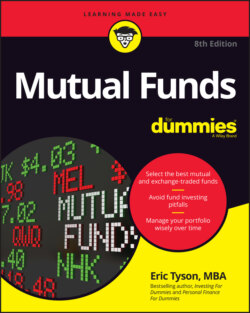Читать книгу Mutual Funds For Dummies - Eric Tyson - Страница 95
BEWARE OF “FINANCIAL ADVISORS” IN LOVE WITH ETFs
ОглавлениеI began work as a financial advisor in 1990. I was just about the only practitioner at the time who worked solely on an hourly basis. Most of the fee-based advisors at that time managed their clients’ portfolios by using mutual funds. I was struck by the fact that many advisors didn’t use or recommend low-cost index funds. In speaking with some of these advisors, I got the sense that they were somewhat threatened by index funds because the investing process was so simplified that clients might question the value in paying the advisor an ongoing fee of about 1 percent to manage their money among funds.
Interestingly, some advisors now boast that they use ETFs as the investment vehicle to manage their clients’ portfolios. Ironically, they crow about the low cost of ETFs. Why do some advisors now embrace and tout ETFs when they didn’t advocate index funds? ETFs are complicated, and advisors feel safer using them and don’t worry as much about having clients feel that they could do this on their own. Advisors who charge ongoing management fees while using ETFs aren’t performing low-cost investment management. If the ETFs they’re using average about 0.5 percent in annual fees, paying the advisor 1 percent per year on top of that to shift your money around among various ETFs triples your total costs! See Chapter 23 for how to find a good advisor.
Be sure to check whether the ETF you’re considering is selling at a premium or discount to its net asset value. (You can find this information on the ETF provider’s website after the market’s close each business day.) I strongly encourage you to employ the buy-and-hold mentality that I advocate throughout this book — don’t hop in and out of ETFs. You should also buy only the ETFs that track the broader market indexes and that have the lowest expense ratios. Avoid those that track narrow industry groups or single, smaller countries. See Chapters 11 through 15 for specific ETFs that I like for specific situations.
If you’re truly interested in investing in ETFs and you’re a more advanced investor, make sure you know which funds are the best ETFs. The best ETFs, like the best index funds, have low expense ratios. My top picks among the leading providers of ETFs include the following:
Vanguard: Historically, Vanguard has been the low-cost leader with index funds and now has the lowest cost with its ETFs as well. So, if you’re interested in finding out more about ETFs, be sure to examine Vanguard’s ETFs. (
www.vanguard.com; 800-662-7447)iShares: BlackRock has competitive expense ratios on some domestic ETFs based on quality indexes, such as Russell, Morningstar, S&P, Lehman, and Dow Jones. (
www.ishares.com; 800-474-2737)State Street Global Advisors SPDRs: This group uses indexes from Dow Jones, S&P, Russell, and MSCI, among others. (
www.ssgafunds.com; 866-787-2257)
